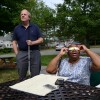So, there you have it: the NFH, that’s ‘Not From Here,’ versus the OFD, ‘Originally From Dorchester.’
Michelle Wu and Annissa Essaibi George are the preliminary victors in the Boston mayor’s race. For the next five weeks or so, the two will compete for the mayorship in a familiar political dance well known in Boston.
More Commentary
In Boston parlance, OFD, ‘Originally From Dorchester’ — emphasis on originally and Dorchester — screams Boston roots. Dorchester is not only one of the city’s largest neighborhoods, it also boasts one of Boston’s strongest voting blocs. Residents here have helped foster the careers of long-serving politicians like Boston City Councilor Frank Baker and state-representative-turned-mayor Marty Walsh.
Not only does Essaibi George live down the street from Walsh’s former home, but her Boston accent also establishes her as an OFD. For years, being a full-fledged member of the Originally From Dorchester club has given candidates a powerful edge. Essaibi George can send up the political bat signal to move large numbers of Dorchester’s reliable Super Voters to the polls.
Michelle Wu, meanwhile, has spent the bulk of her adult life in Boston and has quickly risen in the city’s political ranks — first woman City Council President, for example. But for many, the Chicago transplant is still an NFH — ‘Not From Here.’ If OFD is a badge of honor in some quarters, inexplicably, in this city of transplants, NFH is almost a pejorative.
Yet Boston has thrived because of the talents of both its transient academic population and the resettled residents, like Wu, who fill the ranks of the city’s top leadership jobs. That makes Wu somebody to whom the thousands of other not-yet-considered Bostonians can relate.
Her advantage is coalition-building across many neighborhoods, the key to her past victories. In the Boston City Council At-Large races, both she and Essaibi George have been the top-two vote-getters. But Wu has always been first.
Some have suggested that, because no Black candidates advanced during the low-turnout preliminary vote, race would not be a factor as both Michelle Wu and Annissa Essaibi George both identity as people of color. I disagree. In a town with a fraught racial history, I’m bracing for the bubbling-up of racial animus.
The reality is, OFD is synonymous with white residents, and Essaibi George’s guaranteed voting bloc is predominantly white, even though Dorchester is one of the city’s most diverse neighborhoods. Wu’s cross-neighborhood coalition is racially mixed, but for her, NFH has a double meaning. As an Asian-American, she will have to continue to grapple with the perpetual foreigner stereotype.
In conceding, Andrea Campbell told supporters that the combined numbers of voters who supported her — a Black woman candidate — and Acting Mayor Kim Janey, also a Black woman, was an indication that Boston had “an appetite for change.” But racial change is never easy in America, especially for a city with a 200-year history of only electing white men.
Whoever Boston voters elect will represent how hungry this city is for a future that is not steeped in its past.









